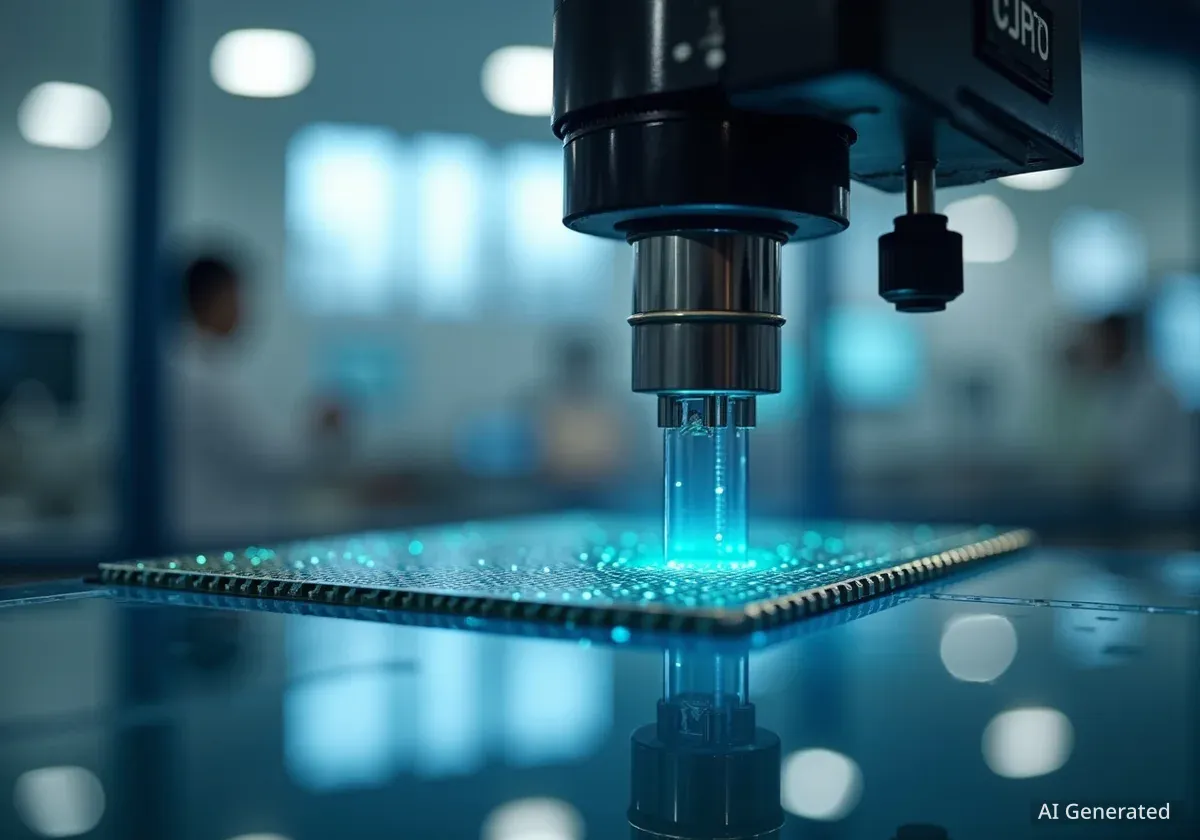Aehr Test Systems announced its financial results for the first quarter of fiscal year 2026, reporting a decrease in revenue compared to the same period last year. Despite the dip, the company highlighted strong momentum in the testing equipment market for artificial intelligence (AI) and data center semiconductors, which it views as a significant long-term growth opportunity.
Key Takeaways
- Net revenue for the first quarter of fiscal 2026 was $11.0 million, a decrease from $13.1 million in the prior year's first quarter.
- The company reported a GAAP net loss of $2.1 million, a shift from a net income of $0.7 million in the same quarter last year.
- Aehr noted strong customer engagement and follow-on orders for equipment used to test high-performance AI processors.
- Growth opportunities were also identified in silicon photonics, gallium nitride, and silicon carbide markets.
First Quarter Financial Performance
Aehr Test Systems (NASDAQ: AEHR) released its financial data for the quarter ending August 29, 2025. The company's net revenue stood at $11.0 million, down from $13.1 million reported in the first quarter of fiscal 2025. This change in revenue was accompanied by a shift in profitability.
The company recorded a GAAP net loss of $2.1 million, which translates to a loss of $0.07 per diluted share. This contrasts with a GAAP net income of $0.7 million, or $0.02 per diluted share, in the same period of the previous fiscal year.
On a non-GAAP basis, which excludes items like stock-based compensation, net income was $0.2 million, or $0.01 per diluted share. This is a significant reduction from the non-GAAP net income of $2.2 million, or $0.07 per diluted share, from the first quarter of fiscal 2025.
Q1 FY2026 Financial Snapshot
- Net Revenue: $11.0 million
- Bookings: $11.4 million
- Backlog (as of Aug 29, 2025): $15.5 million
- Total Cash and Equivalents: $24.7 million
Despite the year-over-year decline, Gayn Erickson, President and CEO of Aehr Test Systems, stated that the results were ahead of market consensus estimates for both revenue and earnings. Bookings for the quarter were reported at $11.4 million, with the company's backlog reaching $15.5 million by the end of August.
AI and Data Centers Drive Business Activity
A central theme in the company's announcement was the increasing demand for semiconductor test and burn-in equipment driven by the artificial intelligence sector. Erickson emphasized the momentum in sales related to AI processors, which require rigorous testing to ensure reliability in demanding data center environments.
"Momentum in packaged part qualification and production burn-in for AI processors continued to drive growth in our new Sonoma ultra-high-power packaged part burn-in systems and consumables," said Gayn Erickson.
He noted that a key customer, described as a "world-leading hyperscaler," placed multiple follow-on production orders for Sonoma systems. This customer is reportedly developing its own advanced AI processors and has requested shorter lead times to meet higher-than-expected production volumes.
Sonoma System Enhancements
Aehr has been upgrading its Sonoma test system to meet the needs of AI chip manufacturers. Following the acquisition of Incal Technology, the company introduced several key enhancements:
- Expanded power-per-device capabilities to 2000W.
- Increased parallelism for testing more devices simultaneously.
- Integrated full automation with a package device handler.
According to the company, these upgrades have attracted significant interest, with 10 companies visiting Aehr's Fremont facility in the last quarter to review the enhanced system. Positive feedback is expected to translate into new applications and orders within the current fiscal year.
Expanding into Wafer Level Testing
Beyond packaged chips, Aehr is also advancing its capabilities in wafer level burn-in (WLBI), a process where testing is performed on the entire silicon wafer before it is cut into individual chips. This method can improve efficiency and identify defects earlier in the manufacturing process.
The company reported it delivered the world's first production WLBI systems for AI processors to a major global Outsourced Assembly and Test House (OSAT). This installation serves as a showcase for other potential AI customers.
What is Burn-In Testing?
Burn-in is a stress-testing process for electronic components, particularly semiconductors. Devices are operated at elevated temperatures and voltages to screen for early-life failures. This is critical for components used in mission-critical applications like data centers, automotive systems, and medical devices, where reliability is paramount.
Aehr is also pursuing a strategic partnership with this OSAT to provide comprehensive wafer level test solutions for high-performance computing (HPC) and AI processors. Additionally, the company has started a paid evaluation program with another top-tier AI processor supplier to validate its FOX-XP™ systems for WLBI.
Growth Across Other Tech Sectors
While AI remains a primary focus, Aehr sees growing demand in several other key markets. The company believes these areas will contribute to order growth throughout the fiscal year.
- Silicon Photonics: Demand for optical components in data centers is driving sales. Aehr recently upgraded a major customer's system to a higher-power configuration, doubling its device testing capacity.
- Hard Disk Drives: The massive data generation from AI applications is creating new demand for high-capacity storage, leading to planned purchases of Aehr's WLBI systems by a top storage supplier.
- Gallium Nitride (GaN): These devices are used for power efficiency in data centers and automotive systems. Aehr reports multiple new customer engagements in this segment.
- Silicon Carbide (SiC): Primarily used in electric vehicles and renewable energy, this market is expected to see growth weighted toward the second half of the year, with further strengthening anticipated in fiscal 2027.
Erickson highlighted generative AI and the electrification of transportation as two major macro-trends increasing the need for high-reliability semiconductors. As devices operate at higher power levels in critical systems, comprehensive testing becomes essential.
Looking ahead, Aehr remains cautious due to ongoing uncertainty related to tariffs and has not reinstated formal financial guidance. However, the management expressed confidence in the company's growth opportunities across its diverse markets.





